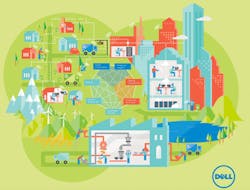Dell Partners with Supplier to Launch Recycled Carbon Fiber
Dell announced on Sept. 30 that it will be working with supplier SABIC to recycle excess carbon fiber and scrap raw materials into new Dell products.
Dell estimates that this effort will prevent 820,000 pounds of carbon fiber from ending up in landfills. The recycled carbon fiber materials have an approximately 11% smaller carbon footprint than simply using virgin carbon fiber, according to the company.
The company will use the recycled carbon fibers in select Latitude and Alienware products, with plans to expand across these two product portfolios in 2016.
The company has recycled 4.2 million pounds of closed-loop plastics into enclosures for new Dell products since it began its closed-loop recycled plastics supply chain in January 2014. These plastics were used in more than 30 flat panel monitor models and three Dell OptiPlex desktops available globally, with plans to scale across servers and other products in 2016.
Dell’s process was certified by UL Environment as the first closed-loop supply chain, and continues to be the only one in the industry. Dell was also able to reduce its product carbon footprint for the closed-loop products by 11% and realized a cost savings over previous sources.
Dell hopes to reduce the amount of waste and by-product created from technology manufacturing by reusing materials already in circulation and seeking renewable alternatives where they exist. Since 2013, Dell has incorporated more than 21 million pounds of recycled plastics from sources including water bottles and CD cases as it continues to work towards a goal of using 50 million pounds of recycled materials by 2020. In addition to finding ways to build circular thinking into their products and operations,
Dell also announced it has joined the Ellen MacArthur Foundation’s Circular Economy 100 program, to collaborate with like-minded businesses and industries to advance the circular agenda. As part of the CE100, Dell will work with global business leaders to develop new approaches to how companies manufacture goods, identify new partnership opportunities and contribute best practices that help businesses and society accelerate the shift to a circular economy.
The transition to a more circular economy not only delivers substantial environmental benefit through reducing waste and reliance on natural resources, it also has an economic impact, with estimates that this shift overtime could create $1 trillion in additional value.
